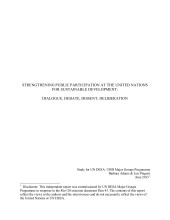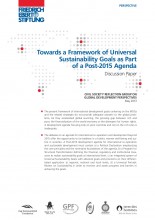Nachhaltige Entwicklung und Menschenrechte
on the Follow-up to the outcome of the Millennium Summit, “A life of dignity for all: accelerating progress towards the Millennium Development Goals and advancing the United Nations development agenda beyond"
ANND Statement
Mixed report card
DIALOGUE, DEBATE, DISSENT, DELIBERATION
"Climate Financing" in Developing Countries
Essential for Development Sustainability in Pacific Small Island States
The Agenda of the United Nations Should Respect Nature and Listen to the People
“The worst thing about living in extreme poverty is the contempt - that they treat you like you are worthless, that they look at you with disgust and fear and that they even treat you like an enemy.”
“We experience the violence of being discriminated against, of not existing, not being part of the same world, not being treated like other human beings.”
Time and again, poverty is associated with violence against the people that suffer it. Poverty is frequently [...]
The debates on an agenda for international co-operation and development beyond 2015 offer the opportunity to (re-)address in a holistic manner well-being and justice in societies. Given the economic, social and ecological challenges in the world, this is urgently needed.
The present framework of international development goals centering on the MDGs and the related strategies do not provide adequate answers to the global problems, be they accelerated global warming, the growing gap between rich and poor, the financialization of the [...]
Seitennummerierung
- Vorherige Seite
- Page 46
- Nächste Seite


